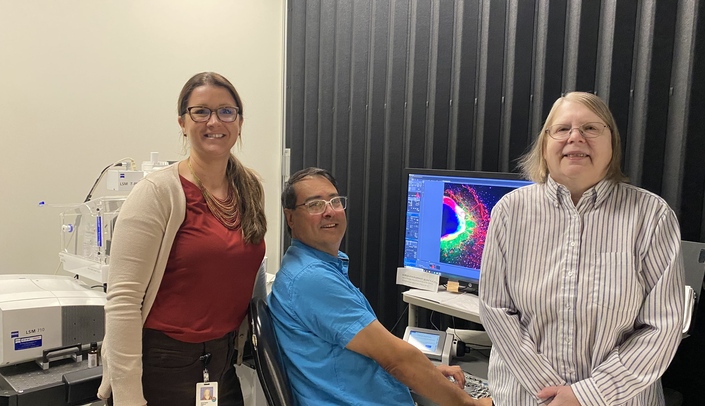No matter what challenges Heather Jensen-Smith, PhD, has faced or where her career has taken her, scientific research is the one constant in her life.
Even when she found herself having to pivot from undergraduate neuropharmacology research at the University of Nebraska-Lincoln to her doctoral studies of hearing and hearing loss at Creighton University after developing an allergy to rodent dander, scientific research kept her career moving forward
“Research has always been the cornerstone,” Dr. Smith said.
An assistant professor in the Eppley Institute at the University of Nebraska Medical Center, Dr. Jensen-Smith is the new director of the Advanced Microscopy Core Facility housed there. An honor she earned through years of managing the microscopy core facility at Creighton University under the guidance of the late Richard Hallworth, PhD her skills in the lab, as well as her creativity in overcoming any challenges and obstacles that have befallen her.
“I very accidentally fell into science and research through a horrific mistake as a freshman majoring in psychology in college when I missed a major exam in an upper-level bio-psychology course that I had gotten special permission to take,” Dr. Jensen-Smith said.
That snafu led to an undergraduate research opportunity with a new professor on campus who was looking for undergraduate students to mentor in his lab.
Rick Bevins, PhD, the current interim associate vice chancellor for research at the University of Nebraska-Lincoln, would turn out to be an influential mentor.
“Dr. Bevins is phenomenal,” Dr. Jensen-Smith said. “He understands the importance of training and mentoring, in giving students the space they need to fully understand the skills and techniques used in the lab and the research itself,” she said.
That opportunity, she said, “opened up a new career path for me.”
Her career path and research focus transitioned at UNMC to the treatment and prevention of various types of cancers, including pancreatic and breast cancer. With nearly two decades of experience and training in microscopy, Dr. Jensen-Smith’s passion for biomedical imaging solidified her biomedical imaging career path and the opportunity to support diverse research endeavors.
“It’s really fascinating,” she said.
As for how she navigated this career path, Dr. Jensen Smith said she tells students, “You don’t always know what you will love until you try it. Research is not for everyone, but you won’t know until you put that first foot forward. My career has changed a number of ways, but I’ve always found my path because I’ve always just put one foot forward.”
